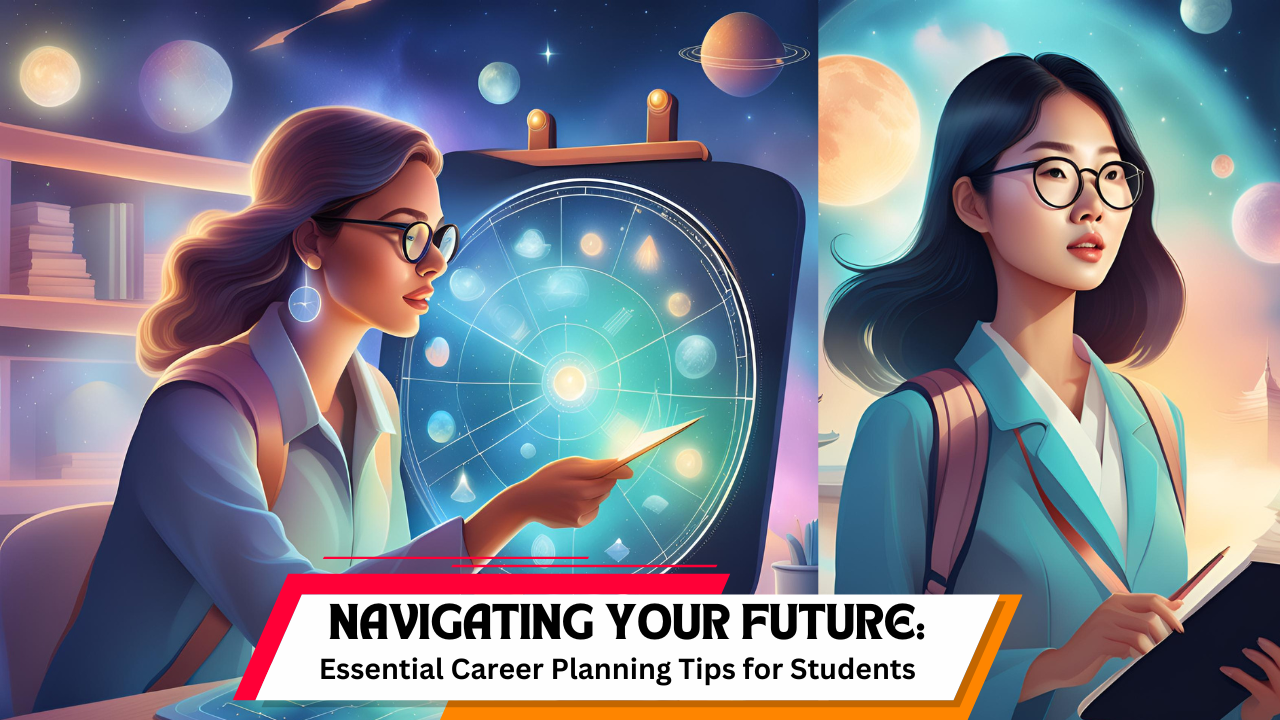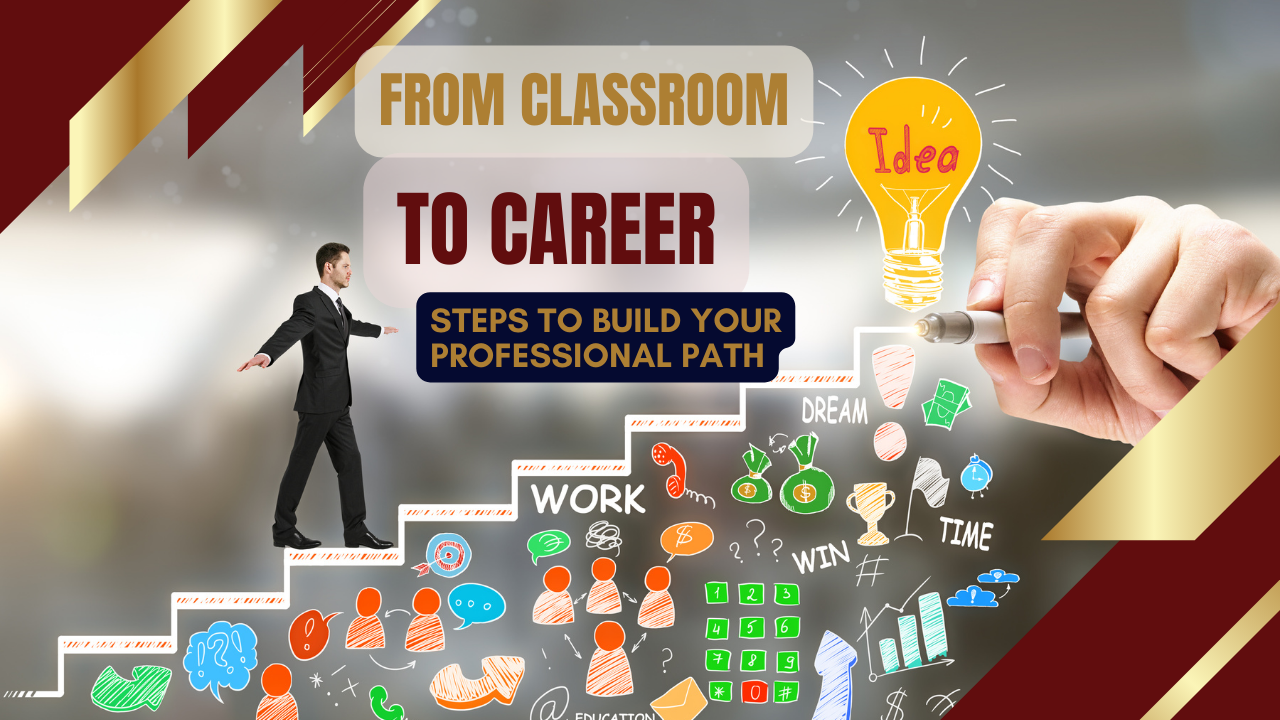Navigating Your Future: Essential Career Planning Tips for Students
As you stand at the crossroads of your academic journey, the road ahead can seem both exhilarating and daunting. Choosing a career path is one of the most significant decisions you’ll make, and it requires careful thought, planning, and a touch of soul-searching. Here’s a guide to help you navigate your future with confidence and clarity.
1. Self-Discovery: Know Yourself
The first step in career planning is understanding who you are. Take the time to reflect on your interests, strengths, values, and passions. What subjects excite you? What activities make you lose track of time? Consider taking personality assessments or career aptitude tests to gain insights into fields that align with your natural abilities and interests.
2. Research Career Options
Once you have a better understanding of yourself, start exploring different career options. Use resources like the Occupational Outlook Handbook, career websites, and informational interviews to gather information. Look into job descriptions, required qualifications, and future job market trends. This research will help you identify careers that not only match your skills but also offer growth and stability.
3. Set SMART Goals
Setting goals is crucial for turning your career dreams into reality. Ensure your goals are Specific, Measurable, Achievable, Relevant, and Time-bound (SMART). For instance, instead of saying, “I want to be successful,” define what success means to you. A SMART goal could be, “I want to secure an internship in a marketing firm by the end of my junior year.”

4. Develop a Plan of Action
With your goals in place, create a step-by-step plan to achieve them. Break down your larger goals into smaller, manageable tasks. For example, if your goal is to become a graphic designer, your action plan might include enrolling in relevant courses, building a portfolio, and gaining work experience through internships or freelance projects.
5. Gain Relevant Experience
Experience is often the bridge between education and employment. Seek out internships, part-time jobs, volunteer opportunities, or extracurricular activities related to your chosen field. Not only will this enhance your resume, but it will also give you a taste of what working in that field is like, helping you confirm if it’s the right fit for you.
6. Network and Build Relationships
Networking is a powerful tool in career planning. Attend industry events, join professional organizations, and connect with alumni or professionals in your field of interest. Building relationships can lead to valuable advice, mentorship, and potential job opportunities. Remember, it’s not just about what you know, but who you know.
7. Seek Guidance
Don’t hesitate to seek advice from career counselors, mentors, or teachers. They can provide valuable insights, help you navigate your options, and support you in making informed decisions. Many schools and universities offer career services that include counseling, workshops, and job placement assistance.
8. Stay Flexible and Open-Minded
The career planning process is rarely linear. Be prepared for detours and changes along the way. The job market evolves, and so do your interests and skills. Staying flexible and open to new opportunities will help you adapt and thrive in the ever-changing landscape of the professional world.
9. Continuous Learning and Skill Development
The journey doesn’t end once you land your first job. Commit to lifelong learning and skill development. Whether it’s through formal education, online courses, or self-study, continuously enhancing your skill set will keep you competitive and open to new career opportunities.
10. Reflect and Reevaluate
Regularly take the time to reflect on your career journey and evaluate your progress. Are you happy and fulfilled? Are you meeting your goals? Don’t be afraid to make adjustments if your career path no longer aligns with your personal growth and aspirations.
Tips for School Students: Step by Step for Navigating Your Future: Essential Career Planning Tips for Students
1. Self-Assessment
- Identify Interests: Make a list of activities, subjects, and hobbies that you enjoy and find engaging.
- Assess Strengths and Weaknesses: Recognize your strengths and areas where you need improvement. Ask for feedback from teachers, friends, and family.
- Personality Tests: Take career-oriented personality tests like the Myers-Briggs Type Indicator (MBTI) or Holland Code to understand your personality traits and potential career matches.
2. Research Careers
- Explore Career Options: Use online resources, books, and career guides to learn about various professions.
- Understand Job Roles: Look into the day-to-day responsibilities, required skills, and qualifications for careers that interest you.
- Future Prospects: Research the demand and growth prospects for careers you’re considering to ensure long-term viability.

3. Set Goals: career planning
- Short-Term Goals: Set achievable goals for the next year or two, such as improving grades, joining clubs, or gaining relevant skills.
- Long-Term Goals: Define where you want to be in 5-10 years. Consider the education and experience you will need to reach these goals.
- SMART Goals: Make sure your goals are Specific, Measurable, Achievable, Relevant, and Time-bound.
4. Seek Guidance
- Mentorship: Find mentors among teachers, counselors, and professionals in fields of interest who can provide advice and support.
- Career Counseling: Utilize school career counseling services to get personalized advice and access to resources.
- Family and Friends: Discuss your career ideas with family and friends for additional perspectives and support.
5. Gain Experience
- Internships and Part-Time Jobs: Look for internships or part-time jobs in fields that interest you to gain practical experience.
- Volunteer Work: Engage in volunteer work to develop skills, meet professionals, and explore different career environments.
- Extracurricular Activities: Participate in clubs, sports, and other activities to develop teamwork, leadership, and other soft skills.
6. Develop Skills
- Academic Skills: Focus on excelling in subjects relevant to your career interests. Consider advanced courses or electives that align with your goals.
- Soft Skills: Work on communication, teamwork, problem-solving, and time management skills.
- Technical Skills: Learn relevant technical skills through courses, workshops, or self-study (e.g., coding, graphic design, data analysis).
7. Create a Career Plan
- Education Path: Plan your educational journey, including high school courses, college majors, and any additional certifications or degrees you might need.
- Timeline: Develop a timeline that outlines the steps you need to take from now until you enter your desired career.
- Backup Plans: Have alternative career paths in mind in case your primary plan changes or doesn’t work out as expected.
8. Stay Flexible and Open-Minded
- Adaptability: Be open to new opportunities and ready to adjust your plans as you learn more about yourself and the job market.
- Continuous Learning: Commit to lifelong learning and staying updated with changes in your field of interest.
- Networking: Build and maintain a network of contacts in your areas of interest to help with advice, opportunities, and support.
9. Evaluate and Adjust
- Regular Reflection: Periodically reflect on your goals, experiences, and progress to ensure you’re on the right path.
- Seek Feedback: Continuously seek feedback from mentors, teachers, and peers to refine your career plan.
- Adjust Goals: Be prepared to adjust your goals and plans as needed based on new experiences, interests, and opportunities.
By following these steps, students can systematically explore their interests, gain relevant experience, and develop a clear and adaptable career planning.
Conclusion
Navigating Your Future: Essential Career Planning Tips for Students Navigating your future and planning your career can be a challenging yet rewarding experience. By knowing yourself, setting clear goals, gaining relevant experience, and staying adaptable, you can create a fulfilling career path that reflects your passions and strengths.
Remember, the journey is just as important as the destination, so embrace each step with an open heart and mind. Your future is a canvas—paint it with purpose and joy.

FAQ: Essential Career Planning Tips for School Students
1. Why is career planning important for school students?
Career planning helps students identify their interests and strengths early, set achievable goals, and make informed decisions about their education and future career. It provides a roadmap to follow, reduces uncertainty, and helps students stay focused and motivated.
2. At what age should students start career planning?
Students can start thinking about their interests and strengths as early as middle school. Formal career planning often begins in high school, but exploring different activities and gaining self-awareness at an early age is beneficial.
3. How can students identify their strengths and interests?
Students can identify their strengths and interests by considering activities they enjoy, seeking feedback from teachers and peers, taking personality and career assessment tests, and experimenting with different extracurricular activities and hobbies.
4. What resources are available for career research?
Students can use online career resources, such as career exploration websites (e.g., O*NET Online, MyNextMove), career counseling services, library books, and informational interviews with professionals in their fields of interest.
5. How can students set effective career goals?
Students should set SMART goals — specific, measurable, achievable, relevant, and time-bound. They should set both short-term and long-term goals, making sure they align with their interests and career aspirations.
6. What role do advisors and counselors play in career planning?
Advisors and counselors provide guidance, support, and valuable insights based on their experiences. They can help students explore career options, set realistic goals, and cope with challenges along the way.
7. How can students gain relevant experience while still in school?
Students can gain experience through internships, part-time jobs, volunteer work, and participation in extracurricular activities. These opportunities allow students to develop skills, network, and gain insight into various career fields.
8. What essential skills should students develop for their future careers?
Essential skills include academic skills, communication, teamwork, problem-solving, time management, and relevant technical skills (e.g., coding, graphic design, data analysis). Soft skills such as adaptability, leadership, and creativity are also important.
9. How can students create a career plan?
Students can create a career plan by researching potential careers, setting short-term and long-term goals, outlining their educational path, and developing a timeline with specific steps to achieve their goals. It is important to remain flexible and be open to adjustments.
10. What if a student’s interests change over time?
It is normal for interests to change over time. Students should remain flexible and open-minded, regularly reflecting on their goals and experiences. They can adjust their career plans as needed to keep up with their changing interests and new opportunities.
11. How can students create a balance between academic and career exploration activities?
Effective time management is important. Students should prioritize their academic responsibilities while setting aside dedicated time for career exploration activities. Developing a balanced schedule and getting support from teachers and family can help successfully manage both areas.
12. Why is networking important in career planning?
Networking allows students to connect with professionals, gain insight into different careers, and discover opportunities. Building a network of contacts can lead to valuable advice, guidance, and potential job opportunities in the future.
13. How can students stay motivated during their career planning journey?
Students can stay motivated by setting achievable goals, celebrating small successes, seeking support from mentors and peers, and constantly reminding themselves of their long-term aspirations. Getting involved in activities they are passionate about also helps maintain motivation.
By addressing these common questions, students can gain a clearer understanding of the career planning process and feel more confident in taking steps toward their future career.







